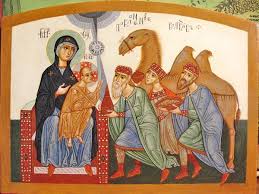And another year has come and gone. 365 days, filled with experiences; often the same old, same old, but then there were also many unexpected things happening. At the end of a year, many like to stop, take a moment, and look back. News magazines and TV channels bring us the year in review, the person of the year, the event of the year.
We know where we have been. We know where we are coming from. But for many, the question also arises, as we are now at the beginning of a New Year: where are we going?
Astrologists, fortune tellers, and psychics make a business of the urge of people to know: what’s going to happen? People want to be prepared. We want to be in control, as much as we can.
Now, when I look back at my 2014, I have to say that quite a few unexpected things happened, for better and worse. Just for example, one year ago I would not have thought that I would become the pastor of this church, St. Matthew’s. Surprise! And many aspects of my ministry here have been totally unexpected, and very exciting. The possibilities seem to be endless!
Think back at the year as you experienced it: were there any surprises? Totally unexpected things happening to you?
Even though we try to manage our lives, prepare for eventualities, and plan ahead, there are those things that lead us in totally surprising directions, and sometimes even turn our whole lives upside down. In a Bible study that I led at my former church, the group went through an exercise: draw two maps of your life: one showing how you thought your life would turn out, twenty years ago; and one showing how life actually turned out. Well, none of our hopes and dreams and expectations came true. Life just happened, and took us to totally unexpected places, and many of them better than we ever imagined.
Where are we going? If we are honest with ourselves, we have to say: we just don’t know. We don’t know what this New Year will bring for any of us, what joys, what sorrows, what losses, what gifts. We may have a general hunch, but in the end, it is out of our control. Anything could happen. And if we say we believe in God, and if we say God has all power, then we should give God the opportunity to make things happen in our lives.
God bursts into the life of the magi we hear about in today’s gospel – and they don’t even know it. In Christian tradition, those magi have become wise men, even kings; we like to think of them as three; and maybe there were three, maybe there were two, maybe there were 20, we don’t know, the Bible doesn’t say. Maybe there were women among them, we don’t know. But those people definitely were not kings, and not what we today would perceive as wise men; they were star watchers, fortune tellers, looking into the sky for signs for the future. The Jewish faithful considered such people charlatans, and blasphemous, because they consulted dubious signs rather than putting their trust in God.
God bursts into the lives of those magi, those magicians, those fortunetellers, in a, if you think about it, quite shocking way: God lets the star appear, the sign that a new king is born. Those magi don’t know where they are going. They have a general hunch, a general direction, but don’t know where they’d end up on their journey. They have a vague expectation – to find a king where the star shines brightly – but still don’t know where and how and when and under what circumstances.
The magi are out for the venture, the adventure, of their lives. They have no clue what they are following – but follow they do.
At the end of their journey, there is a little hiccup; where do you find a new king? Why, in a palace! And so the magi follow their expectation rather than the star to the very end, and come to King Herod’s court. Where is the child, is the question? Again, it takes God’s intervention, found in the ancient prophecies and scriptures, to guide the magi to the right place.
The right place – but not the place they expected. Again, tradition places the star and the magi at the manger. If you read the gospel carefully, you will see that it mentions a house in Bethlehem – it seems Mary and Joseph found a more appropriate place to stay by the time the magi reach their destination. It seems the careful study of the Bible leads us into some unexpected places, too.
Anyway, even though the magi may not see the poverty and filth of the stable where Jesus was born, they still see a humble house, a young mother, a carpenter. All their expectations are shattered. God breaks into their lives and turns them upside down. They meet God, the child. They meet the newborn king, in humble circumstances, among the simple people. (And, probably unbeknownst to them, their precious gifts have a spiritual meaning : gold as a symbol of kingship on earth, frankincense (an incense) as a symbol of priesthood, and myrrh (an embalming oil) as a symbol of death.)
The magi follow the star, because they believe in the sign. They come to the humble house, because they trusted the ancient prophecies of the Jewish Scriptures. They pay homage to the child and offer their gifts because they understand: something amazing has happened and is happening. This newborn king is a very special king indeed.
As it is time for them to return, the magi receive instructions in a dream not to return to the court of Herod, who, jealous and anxious that his plans for his life may be dramatically altered by this new child, wants to destroy the child. Today’s gospel said, ‘And they left for their own country by another road’. Now a more accurate translation would be, ‘and they left for they own country by another way.’ Now you might now, that the first followers of Christ called their movement ‘The Way’, and so more is said in this sentence than the magi using some other route back home; those people are changed. Their ways change, their lives are changed, their understanding has changed. God breaks into their lives, and they realize it. Nothing can be like before.
The magi do not know where they are going, or what they would find. But in the end, they find God – and realize that God has been there all along on their journey.
Where are we going in this fresh, nice, new, and unused year? We don’t know. But if we leave God enough room to break into our lives – if we try to let go and let God – if we look for the child, for the king, for God in all the unexpected places in our lives, we will end up where we are supposed to be. And ultimately find our way home to God.
My wish for you, for us, is summarized in a poem by Minnie Louise Harkins; it is based on a proverb from China. Harkins writes:
I said to the man who stood at the gate of the year
‘Give me a light that I may tread safely into the unknown.’
And he replied,
‘Go into the darkness and put your hand into the hand of God
That shall be to you better than light and safer than a known way!’
So I went forth and finding the Hand of God
Trod gladly into the night
He led me towards the hills
And the breaking of day in the lone east.
So heart be still!
What need our human life to know
If God hath comprehension?
In all the dizzy strife of things
Both high and low,
God hideth his intention.”
Go into the darkness and the mystery of this New Year, trusting, that God is there, always, by your side.





